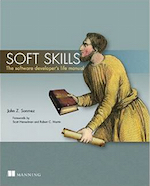 Soft Skills are extremely important for developers. Ever since Brian Prince created a Soft Skills series and gave similar talks at conferences, I’ve been made aware of the term “Soft Skills” and why they are important for developers. Too many technologists focus only on coding skills and not on the other things that you need to know in order to advance your career in companies that are staffed by (believe it or not) human beings.
Soft Skills are extremely important for developers. Ever since Brian Prince created a Soft Skills series and gave similar talks at conferences, I’ve been made aware of the term “Soft Skills” and why they are important for developers. Too many technologists focus only on coding skills and not on the other things that you need to know in order to advance your career in companies that are staffed by (believe it or not) human beings.
I even cover a few soft skills that you need in order to be considered a “professional” in my last podcast, because I think they are that important. So, when I heard John Sonmez talk on the Entreprogrammers podcast about this book, I knew I had to check it out.
The book is called Soft Skills: The software developer’s life manual, and it is a great addition to every technical person’s library. Even those who are non-technical could get a lot out of the book, but it does have a target audience of technical individuals.
Soft Skills is written so that it can be read either in one sitting or as a guide to be consulted in times of need. Even if you feel like you “know” a topic, I would still recommend reading the section, because John has such an interesting perspective on each area.
The sections cover Career, Marketing Yourself, Learning, Productivity, Financial, Fitness, and Spirit. No, I didn’t change topics; John does cover money and well-being (mental, physical, and spiritual) in this book. Developers and technical people often live very sedentary lifestyles and build up their minds at the expense of their bodies. John sees no such dichotomy.
I first became familiar with the author from his Simple Programmer blog, his Pluralsight courses, and then from his podcasts and guest podcast appearances. I am a customer of his “How to Market Yourself as a Software Developer” course and this book continues the quality material that he is known for producing. For those who are also customers of that course, there is a little bit of overlap between the course and this book, but nothing that should keep you from buying and reading this book.
Lastly, this book is a great investment. With so many technical books threatening to be out of date before they are finished printing, John Sonmez has authored an instant classic that will be valuable for years to come. Just like Clean Code, The Pragmatic Programmer
, and Code Complete
, this book
is one that you can read and reread in order to continually improve as a person in the workforce.
I highly recommend this book.
 I was listening to James Altucher’s
I was listening to James Altucher’s  A very common objection that I hear that keeps people from teaching others is that the person feels that they aren’t “expert” enough to teach someone else. Any while I don’t doubt that the person lacks the credentials to be an “expert”, they do have some life experience to share.
A very common objection that I hear that keeps people from teaching others is that the person feels that they aren’t “expert” enough to teach someone else. Any while I don’t doubt that the person lacks the credentials to be an “expert”, they do have some life experience to share.